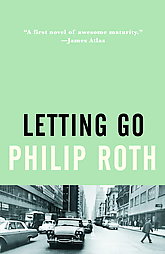
Tackle Roth’s notorious “sophmore slump” novel head-on. Are its 630-some pages brilliant? No, not all of them. In fact, the whole last act left me with that old WTF feeling. Is the book worth reading at all? Yes, absolutely. It is a very good book (not a great one) and it is fascinating to read Roth doing his non-Roth impression. That’s the widest complaint you’ll find out there — that Roth is trying to be another writer (Henry James, they say, but I’ve never read James so I couldn’t tell ya.) It’s like when you first heard “Lay Lady Lay” and weren’t sure if it was Dylan or not.
The story takes place in the drab apartments of young lit professors. Gabe and Paul meet at the U of Iowa, become friends (kinda. . .I mean, all they do is inadvertently insult one another), then both get jobs at U of Chicago. Gabe, a secular Jew, is the son of a successful Manhattan dentist cum widower; Paul, a secular Jew, is the son of a hypocondriac from Brooklyn. He is married to Libby, a Catholic worry-wart with nothing that a dose of Paxil couldn’t cure (alas, they didn’t have this in 1956!) and Gabe is schtupping Martha, a former-bohemian-turned-divorcee with two obnoxious kids and a flatmate who is (gasp with me) dating a negro. Throw in some cocktail parties and cold Chicago winters and epic arguements ensue.
Looking at the above synopsis, boy, this book sounds boring. But it isn’t. There are some absolutely fantastic sequences, some marvelously observed scenes. Giving himself lots of room to explore (600+ pages and no real plot, when you get down to it) each small turn receives ample observation and description. Most notable is the section in Paul and Libby’s first apartment — a dreadful rooming house filled with lecherous, backstabbing old men who wheeze into handkerchiefs and vie to catch Libby on the toilet.
Unlike much of Roth’s later work there isn’t a specific statement coming from this book. I’m left with a general theme. And that theme is: Oy, aren’t people miserable! Pretty much everyone here does whatever they can to short circuit any potential happiness that may come their way. There are a lot of bad decisions on display and a lot of self-aware shattering of another person’s emotions. I suppose that happens in real life, too, but does it happen so regularly? Maybe that’s the real reason people shy away from this book: it’s fucking depressing!







